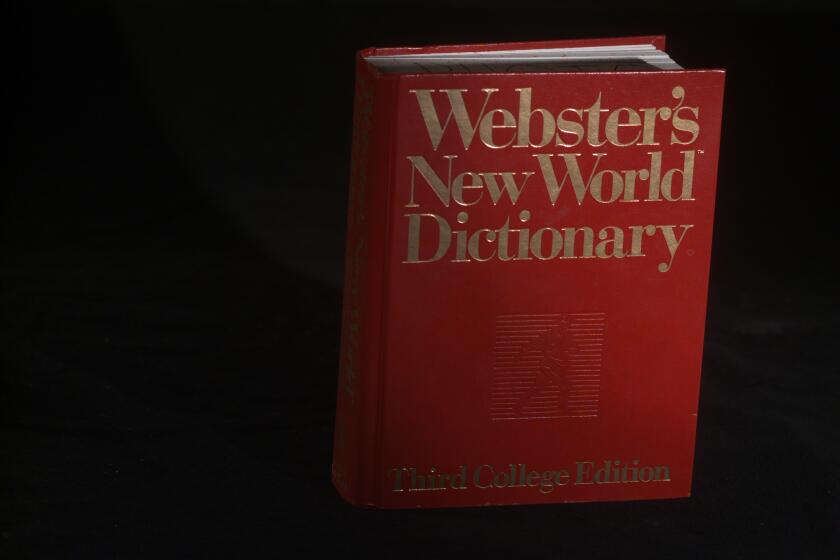A Word, Please: Seven deadly adverbs to avoid in your writing

- Share via
Adverbs are great, right? They let you describe how an action went down — whether it was walking quickly or sleeping soundly or yelling loudly.
But if adverbs are so great, why do editors like me spend a good chunk of our time hacking and slashing them out of articles, stories and other written works? Answer: Because the adverbs you know and love — those dynamic little words with the cute -ly tails — aren’t as benevolent as you think. Some can undermine your message and cast doubt on your credibility. Below we’ll look at seven deadly adverbs to avoid. But first, a few important points.
Adverbs aren’t just those -ly words that describe actions. They’re a broader class of words that includes “therefore,” “outside” and “tomorrow.” Any word that answers the question “where,” “when” or “in what manner” is probably an adverb. The “manner adverbs” we learned about in school are just a subset. When you want to know whether a word is an adverb, check a dictionary, skimming all its entries for each part of speech — noun, adjective, adverb — that applies.
Adverbs can modify whole sentences. There’s a myth that it’s wrong to say, “Hopefully, I’ll win the lottery” because it suggests that you will in fact win the lottery and you’ll do so in a hopeful manner. The idea is that adverbs can only describe actions, so “hopefully” must be describing how you will win. But adverbs can also modify whole sentences.
“Flat adverbs” let you drop the -ly. “Walk slow” and “drive safe” aren’t grammatical errors because “slow” and “safe” are flat adverbs. In formal speech and writing, these flat adverbs may not be your best choice. But they’re not wrong.
Matching subject and verb when inverting statements into questions can get complicated, writes June Casagrande.
Adverbs that don’t add information should probably be cut. Compare “Matt quickly rushed out of the room” with “Stan quickly closed his laptop.” The first gains nothing from the adverb “quickly.” Rushing is, by definition, quick. But you can close a laptop at any speed, so “quickly” opens up an intriguing possibility: Stan has something to hide. Put every adverb to this test: If it adds information, it can stay. If it adds only emphasis, consider chopping it.
Here are seven deadly adverbs that fail that test.
Truly. This word undermines the credibility of your writing. It’s like pleading with the reader to believe your facts instead of letting the facts speak for themselves. “Jane Doe is truly a great woman” is a sales pitch. “Jane Doe is a great woman” is simple fact.
Actually. Sometimes in speech, “actually” can emphasis, making it worthwhile. That benefit doesn’t translate to the page, where “actually” is a waste of ink.
Totally. If a city was devastated, what do you gain by saying it was “totally devastated”? If “devastated” needed this shot of adrenaline, it would mean the word is too weak to get the point across by itself. It’s not. “Devastated” is plenty strong enough on its own.
Currently. When it’s important to distinguish between present and past or future, “currently” can work fine. But most of the time, it’s not necessary. “He’s currently the CEO” is just an inefficient way of saying “He’s the CEO.”
Absolutely. As a standalone affirmative response, “absolutely” is fine. “Do you agree?” “Absolutely.” But when it’s modifying a verb or adjective, it has the same problem as “totally”: It undermines the word’s credibility. “I’m absolutely certain” means your certainty wasn’t all that solid in the first place.
Tragically. As a writer, it’s not your place to tell a reader how to feel about something. Give them the facts and let them decide for themselves. He died in a plane crash. He didn’t tragically die in a plane crash.
Angrily and other emotion adverbs. A punch in the gut is already angry. A gentle caress of the cheek is already loving. So to say “Mark angrily punched Bob in the face” or “Ellen lovingly caressed her daughter’s cheek” is silly. Emotion adverbs are useful only when the emotion isn’t already clear.
June Casagrande is the author of “The Joy of Syntax: A Simple Guide to All the Grammar You Know You Should Know.” She can be reached at JuneTCN@aol.com.
All the latest on Orange County from Orange County.
Get our free TimesOC newsletter.
You may occasionally receive promotional content from the Daily Pilot.






